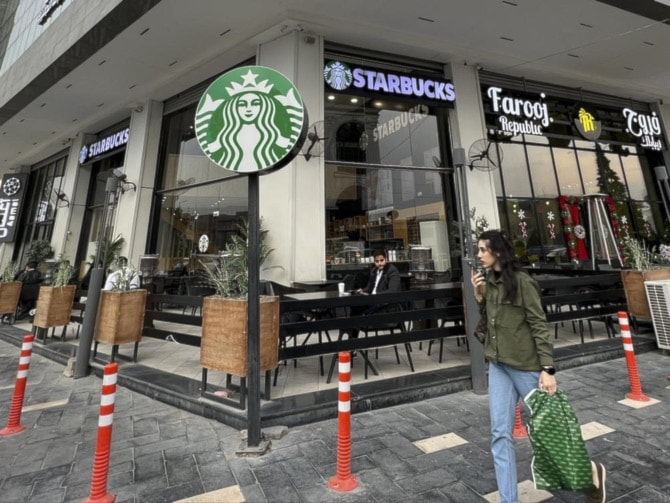How boycott of US brands over Gaza is boosting local businesses in ME
Bloomberg reports that dozens of Starbucks and McDonald's stores in Cairo were completely deserted on a recent weekday, while local businesses have seen increases in profits.
-

A woman walks by an unlicensed Starbucks cafe in Baghdad, Iraq, Wednesday, Dec. 21, 2022. (AP)
The boycotting of Starbucks and other coffee chains in the Middle East is not only a growing and effective trend but is also causing local businesses to boom, Bloomberg reported.
Driven by a wellspring of rage against the United States and Europe for not calling for a ceasefire in Gaza, many buyers in the area, as well as Muslim countries such as Pakistan, are boycotting major international brands, stifling sales for some and causing PR problems for others.
A 19-year-old student in Cairo, Nayera Ahmed, told Bloomberg that being seen at a Starbucks now is "a shame".
“It’s the least we can do. Why would I buy from these Western companies?”
Bloomberg reported that dozens of Starbucks and McDonald's in Cairo were completely deserted on a recent day of the week.
Fashion retailer #Zara is facing backlash again for its new ad campaign that according to social media users mocks the genocide the #Palestinians are enduring in #Gaza. pic.twitter.com/eqB3iUY93u
— Al Mayadeen English (@MayadeenEnglish) December 10, 2023
Meanwhile, sales of a local Egyptian soda brand have quadrupled since the boycott began for people to avoid Coca-Cola and Pepsi.
McDonald's CEO, Chris Kempczinski, acknowledged substantial financial setbacks in early January for the global fast-food chain attributed to the recent global call to boycott brands and franchises that directly or indirectly benefit "Israel" economically.
Shares in Americana Restaurants International Plc, the Middle East franchise operator for KFC, Pizza Hut, Krispy Kreme, and Hardee's, fell as much as 27% on the Saudi stock exchange, with some analysts believing it was due to boycotts.
Boycott calls have only been spreading further. According to Fawaz Gerges, a Middle Eastern studies professor at the London School of Economics, the current boycotts are notable for their intensity, global nature, and leadership by young people.
"I don't think that me boycotting these brands would affect them."
— Al Mayadeen English (@MayadeenEnglish) October 30, 2023
Think again.#PalestineGenocide #GazaUnderAttack pic.twitter.com/rGkj8vVwKt
US favors 'Israel' over Palestinian lives
Gerges expressed that the perception that the US favors "Israel" over Palestinian lives has affected these corporations "because America is implicated and the CEOs are part of this American empire —- commercial, financial, soft-power empire.”
Although the boycott began in October, many Starbucks and McDonald's locations in Jordan remain largely vacant, and Jordanian supermarkets also display stickers identifying a huge number of international brands as "boycotted goods".
The same trend can be seen in Kuwait, where local coffee shops have seen a boost in sales since the boycotts.
Starbucks cited comments on its website when questioned by Bloomberg, including one that reads: “We have no political agenda. We do not use our profits to fund any government or military operations anywhere – and never have.”
Meanwhile, in October, Starbucks filed a lawsuit against its employee union over a post the latter shared on X in solidarity with Palestine.
Two days after Operation Al-Aqsa Flood and following the Israeli war on Gaza, Starbucks Workers United posted “Solidarity with #Palestine!” on X, formerly known as Twitter. Workers United said in its lawsuit that workers put up the tweet without the authorization of union leaders. The post was up for about 40 minutes before it was deleted.
In December, it was reported that Starbucks had lost almost $11 billion in market value, due to intense boycotts and employee strikes in support of Palestine, in addition to a lukewarm holiday promotion.
Moath Fauri, the founder of Astrolabe, a Jordanian coffee chain, reported a spike in profits of up to 30% at some locations.
In Egypt, Spiro Spathis, a 100-year-old local soda brand that had been fighting to rekindle its dwindling appeal, has seen sales jump in the last three months, according to Youssef Atwan, its commercial director.
In Turkey, certain leaders have called for a boycott of Coca-Cola. While the beverage is still readily accessible in stores and restaurants, the Turkish parliament announced in November that it would ban Coke from its cafeterias.
European brands, such as French supermarket chain Carrefour SA, which is present in nine Middle Eastern countries, including Jordan and Egypt, and which last year entered "Israe" via a partnership, have been included in boycotts.

 4 Min Read
4 Min Read








